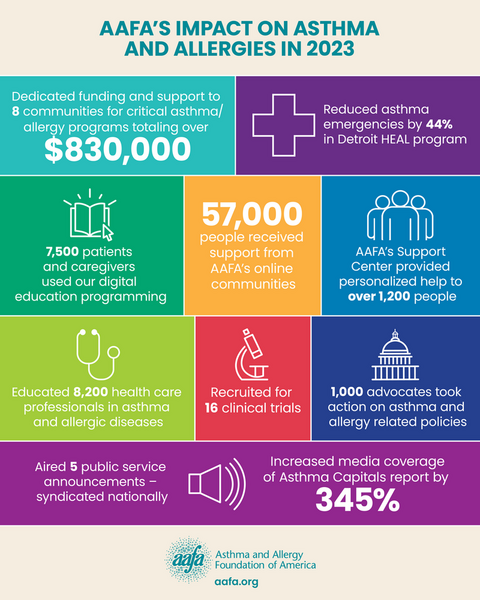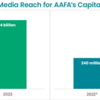For 70 years the Asthma and Allergy Foundation of America has provided trusted information to help the asthma and allergy community improve their health and have a voice in decisions that affect their lives.
Thanks to your generous donations and engagement, we:
- Offered a record number of health education programs.
- Issued groundbreaking reports.
- Advocated for protections to safeguard people’s health.
- Grew our reach to raise awareness about asthma and allergy management.
Below are some of the ways you made a difference to people living with and managing asthma, allergies, and related conditions this year.
IMPROVING HEALTH OUTCOMES
AAFA ‘s Health Equity Advancement and Leadership (HEAL) program improves the quality of life for people with asthma and allergies by addressing health disparities in communities with a large burden of these diseases. As part of AAFA’s HEAL program, AAFA awards funding and technical assistance to local interventions serving at-risk populations.
Two of our major achievements to advance health equity in 2023 included:
- Awarding two new HEAL Awards in New York and Alabama to fund critical asthma programs in these communities.
- Providing funding and assistance to HEAL programs in Detroit, Chicago, Los Angeles, and St. Louis to improve asthma outcomes.
As a HEAL site, AAFA Michigan runs a comprehensive and holistic intervention for adults and adolescents with asthma living in Detroit. Early data from the Detroit HEAL program show promising results. After 6 months in the program, Detroit HEAL participants report:
- Better asthma control, meaning fewer visits to the emergency room or unexpected visits to health care providers.
- Increased connections to asthma specialists.
- Gained knowledge and confidence in asthma management.
AAFA offered a record number of educational programs on asthma, food allergies, eosinophilic esophagitis, atopic dermatitis, chronic spontaneous urticaria and nasal polyps. This means we are able to help more people than ever become knowledgeable on how to best manage asthma and allergic diseases:
- 7,441 people attended our educational programs for people who live with or manage these chronic conditions.
- Nearly 8,200 health care professionals attended our continuing education programs on treating asthma and allergic conditions.
Common misconceptions, myths, and misinformation persist about asthma and allergies in the general public. This can lead to poor health, and in some cases, tragic results. AAFA effectively raised public awareness about asthma and allergic diseases through a series of public service announcements and outreach to the media:
- AAFA aired national television broadcasts to raise awareness about childhood asthma, allergic asthma, respiratory infections, and indoor air quality. These 2-minute PSAs aired in 289 markets reaching 176 million homes.
- During September, the peak month for asthma, AAFA was featured in a media tour appearing on 8 TV segments, 3 radio segments, and 5 websites to reach people in 7 of the 2023 Asthma Capitals.
- AAFA’s educational messages on how the environment and systems impact asthma and allergy management reach a large audience. For example, our messages on the connection between climate and health reached almost 4 billion potential views. Our health disparities messaging reached almost 2 billion views.
AAFA provided personalized support to help people in the everyday management of asthma and allergies by providing resources and support to over 57,000 people on our two online support communities. AAFA also responded to 1,228 inquiries submitted to AAFA’s Support Center and 268 questions submitted to AAFA’s Ask the Allergist service.
ELEVATING COMMUNITY VOICES
AAFA is committed to bringing your voice to the forefront of research and educating people who live with and manage asthma and allergic conditions about ways they can get involved. Elevating community voices is important so that treatments and policies address the needs of the people they intend to serve.
Patient engagement in research is one of the most valuable ways to advance treatments for asthma and allergic diseases. In 2023, AAFA recruited for 16 different research studies and clinical trials .
AAFA published research manuscripts, presented posters at medical conferences, and produced reports from our studies. Major publications included:
- Life with EoE: The Patient Experience and Opportunities for Improve Care in the US. This groundbreaking study report revealed the challenges to timely diagnosis and effective treatment and management of a rare, but increasing allergic condition known as eosinophilic esophagitis (EoE).
- Factors Associated with Epinephrine Use in the Treatment of Anaphylaxis in Infants and Toddlers in the Journal of Allergy and Clinical Immunology: In Practice. This study highlights the importance of anaphylaxis action plans for infants and toddlers.
- AAFA presented five posters at medical conferences, highlighting the importance of patient and healthcare provider education.
AAFA published the annual Allergy Capitals™ and Asthma Capitals™ reports, which rank the 100 most populated cities in the continental U.S. by factors that make it challenging to live with seasonal allergies and asthma. These reports also raised awareness on important topics that impact allergy and asthma management.
- The 2023 Allergy Capitals™ report highlighted three topics related to seasonal allergies: self-care for allergic rhinitis, pollen counts, and the connection between climate change and allergies.
- The 2023 Asthma Capitals™ highlighted information on Asthma Peak Month, health disparities, and steps people can take to improve health outcomes in their communities.
ADVOCACY
AAFA engaged a strong network of nearly 1,000 asthma and allergy advocates to raise awareness of the needs and interests of the asthma and allergy community.
Our major advocacy achievements include:
- Organized an Advocacy Action Day to encourage AAFA community members to contact their state legislators to share the impact of asthma and allergies and highlight what people with asthma and allergies need to live healthy and full lives.
- Convened a Hill Day for AAFA’s Board of Directors to meet with their senators and congress people to share AAFA’s 2023 priorities, including the National Asthma Control Program (NACP) and the Protecting Children with Food Allergies Act.
- Co-hosted a congressional briefing called “The Case for Mandatory Alcohol Labeling” with the Center for Science in the Public Interest (CSPI), the Consumer Federation of America (CFA), Food Allergy Research & Education (FARE), and the National Consumers League (NCL).
- Co-hosted a National Public Health Advocacy Week with the Climate Action Campaign (CAC) and the American Society of PeriAnesthesia Nurses (ASPAN). Advocates participated in over 70 meetings on Capitol Hill and with key agency staff to express support for clean air policies to protect our health and advance environmental justice.
AAFA educated public officials on the challenges of living with asthma and allergies. For example, AAFA:
- Testified before EPA numerous times this year in support of strong and protective standards for dangerous air pollutants from various sources like power plants, cars, and trucks.
- Presented at a congressional briefing on EPA’s proposed car and truck emissions standards, highlighting the health benefits of strong standards for people with asthma and allergies.
- Promoted clean air policies before Congress and the Environmental Protection Agency (EPA).
- Encouraged the EPA and Congress to support policies and funding to promote safe environments for children in school.
- Represented the patient perspective to FDA throughout the year on issues like sesame labeling implementation, the need for options like epinephrine nasal spray, and in support of COVID-19 and RSV vaccines.
SUMMARY OF AAFA’S IMPACT ON ASTHMA AND ALLERGIES IN 2023:





Comments (0)